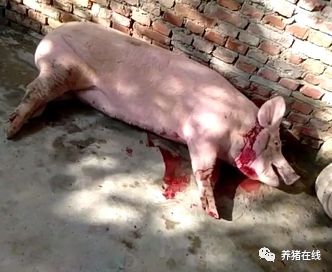Sows don't urinate after delivery? Traditional Chinese medicine says postpartum dysentery. Here is a prescription for treatment.
Traditional Chinese medicine said that postpartum occlusion, with the intensification of pig production, pregnant sow activity space is more and more limited, resulting in increased postpartum urination, the loss caused to pig production is also increasing year by year.
1. etiology
(1)In the later stage of pregnancy, abdominal pressure increases, bladder pressure increases, the excitation threshold of urination center increases, abdominal pressure decreases after childbirth, and bladder is in a semi-paralyzed state.
(2)The delivery time is too long and the bladder is paralyzed by repeated fetal compression.
(3)The urethra is damaged when the fetus is too large or after delivery, and the mucous membrane is edematous.
2. clinical symptoms
Postpartum 1~2 days, no urination, body temperature is generally normal, hunched back Nu responsibility, trickling out or dripping a little. 3~4 days later, abdominal enlargement, lying very carefully, chest breathing. Late body temperature rise, appetite waste, depression, abdominal pain restless.
3. treatment
Multi-use of integrated traditional Chinese and western medicine treatment, western medicine anti-inflammatory, Chinese medicine Tongqiao diuretic.
(1)Put a plank under the abdomen of the pig, two people gently lift the abdomen (be careful to prevent bladder rupture, not used in the middle and late stages of the disease), increase abdominal pressure, increase the stimulation of the expanded bladder to the urination center, so as to generate excitement and urination.
(2)When the pain is restless, use a catheter in time.
(3)Anti-inflammatory. Broad-spectrum antibiotics intramuscular injection, prevent bladder, urethra inflammation.
(4)Traditional Chinese medicine Tongqiao Li water. According to the theory of traditional Chinese medicine, there is a difference between excess and deficiency.
Excess syndrome is mostly caused by metabolic disorder in late pregnancy, endogenous damp-heat or exogenous damp-heat, damp-heat accumulation in lower energizer, adverse bladder gasification, resulting in urine stagnation. Affected animals see red tongue, yellow moss or slippery, yellow and thick urine, nose and lips mirror less moist or dry hair. Bazheng Powder (20g of Akebia, 15g of Dianthi, 10g of Plantago, 10g of Polygonum aviculare, 15g of Talcum, 10g of Gardenia, 10g of Rheum officinale) was used for treatment. Add 15g of Italian rice, 10g of agastache, 5g of scutellaria root, etc. in wet excess; add 10g of Erhua and 10g of forsythia in hot excess.
Deficiency syndrome is mostly spleen and kidney deficiency. Kidney division two yin, kidney deficiency can not gasify water, excessive opening and closing and urine retention. Symptoms: pale mouth, white fur, clear urine, low body temperature, cold ears and nose, depressed spirit. It is suitable for nourishing spleen and kidney, dredging orifices and promoting water retention. The prescription uses Wuling to disperse gardenia and rhubarb, and adds cassia twig 10g, astragalus root 5g, dangshen 10g and taxillus 5g.
(5)In the treatment can not be large infusion or the use of furosemide and other diuretics, in order to prevent aggravation.
- Prev

Why do some sick pigs bark desperately before they die? What's the disease?
Why do some sick pigs bark desperately before they die? What's the disease?
- Next

Sow postpartum paralysis, serious lack of calcium how to do? Look at here!
Sow postpartum paralysis, serious lack of calcium how to do? Look at here!
Related
- On the eggshell is a badge full of pride. British Poultry Egg Market and Consumer observation
- British study: 72% of Britons are willing to buy native eggs raised by insects
- Guidelines for friendly egg production revised the increase of space in chicken sheds can not be forced to change feathers and lay eggs.
- Risk of delay in customs clearance Australia suspends lobster exports to China
- Pig semen-the Vector of virus Transmission (4)
- Pig semen-the Vector of virus Transmission (3)
- Five common causes of difficult control of classical swine fever in clinic and their countermeasures
- Foot-and-mouth disease is the most effective way to prevent it!
- PED is the number one killer of piglets and has to be guarded against in autumn and winter.
- What is "yellow fat pig"? Have you ever heard the pig collector talk about "yellow fat pig"?

